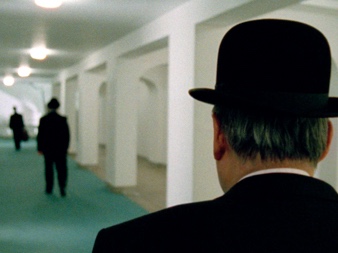
In the collage film Double Take, Grimonprez casts Alfred Hitchcock as a paranoid history professor, unwittingly caught up in a double take on the Cold War period. Subverting a meticulous array of TV footage and The Birds (1963) as an essential metaphor, Double Take links the Kitchen Debate between Nixon and Khrushchev in 1959 to the rise of television, Hitchcock doubles and the American-Russian struggle for power in space in the 1960s. The plot was written by Tom McCarthy, who drew inspiration from the August 25, 1983 essay by Jorge Luis Borges, who in turn drew on Dostoevsky. From the American search for an enemy after the fall of the Berlin Wall, through the ambiguity of love relationships and murders in Hitchcock's thrillers, to the continuous stream of images on YouTube and television, Double Take traces catastrophe culture's relentless assault on the home to the present day.
EN
“"Every day in the mirror, he'll see the man who killed his brother." This is how, on 25 June 2008, journalist Elaine Keogh from the Irish Independent summarized the words of Defence Counsel Derek Kennealy SC, after the jury had returned a guilty verdict in the case of his client Aodhan Donlon, who had stood before the Central Criminal Court in Dundalk, Co. Louth accused of murdering his twin Colm with a chopping knife the year before. "Every day for the rest of his life when he looks in the mirror, he will see the man who killed his twin brother who he loved deeply" is apparently what Mr Kennealy really said, in a statement faintly echoing some famous lines by Oscar Wilde from The Ballad of Reading Gaol: "Yet each man kills the thing he loves/By each let this be heard..." Yet given the fact that Aodhan and Colm were identical twin brothers, products of an unexplained natural cloning event – although some scientists would no doubt dispute the idea that monozygotic twins are clones, on the grounds that they stem from sexual reproduction, involving sperm cells, and are not genetically engineered – which compelled them to share the same DNA, neither the newspaper journalist nor Mr Kennealy himself seems to have dared to state the real and much more tragic consequence of Donlon's act. Every day, for the rest of his life, when looking in the mirror, he shall not only see the man who killed his brother, but much more dramatically and disturbingly, and precisely because his brother was also his identical twin, he shall actually see the man he killed!
[...]
"They say that if you meet your double, you should kill him or that he will kill you. I can't remember which, but the gist of it is that two of you is one too many." This provocative injunction, articulated by the voice-over in Johan Grimonprez's Double Take, suggests that killing one's identical other is nothing more, nothing less than an act of self-protection or even self-preservation, which takes away the constant threat of victimization at the hands of one's counterpart, while releasing and restoring agency in the singular subject, from the moment the latter becomes a murderer. "Colm had punched him [his twin brother Aodhan] twice on the side of the head," the Irish Independent's journalist reported, before Aodhan stabbed him twice in the back with the chopping knife. The stabbing, then, was a self-defensive reaction rather than an unprovoked attack, which may explain why the jury accepted the plea of manslaughter and Aodhan got away with a mere three-and-a-half years imprisonment. When they agreed to have a battle, Colm and Aodhan were clearly no Tweedledum and Tweedledee either; they may have agreed to have a battle over who had spoiled the rattle, but they never quite forgot about their quarrel. Unfortunately for Aodhan Donlon, Rome had already been built and Ireland was not directly in need of another major city. But at least he got noticed. Borrowing from Don DeLillo's White Noise and Mao II in his 1997 "film-essay" dial H-I-S-T-O-R-Y, Grimonprez supported the cinematic narration with the lines "Get killed, and maybe they will notice you" and "Men have tried throughout history to cure themselves by killing others. The dier passively succumbs, the killer lives on."7 If these lines, when taken together, seem contradictory, they can nonetheless be realized simultaneously when the other is the killer's identical counterpart. Kill your double, cure yourself, live on and they will notice you.”
Dany Nobus1
- 1Dany Nobus, "Borges' and Hitchcock's Double Desire," johangrimonprez.be, October 2009.


 ,
,  ,
,  ,
,  ,
,  ,
,  ,
, 